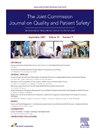在医院实施领先的抗菌药物管理实践的超级促进者:一项定性研究。
IF 2.4
Q2 HEALTH CARE SCIENCES & SERVICES
Joint Commission journal on quality and patient safety
Pub Date : 2025-06-07
DOI:10.1016/j.jcjq.2025.06.001
引用次数: 0
摘要
背景:大多数医院都有抗菌药物管理计划(asp)的基本基础设施。然而,高达50%的医院使用的抗微生物药物处方不当。为了探索有效实施领先实践(lp)的挑战和促进因素,作者对美国联合委员会认可的医院的ASP领导者样本进行了深入的半结构化访谈。方法:在这一定性研究中,研究人员对来自不同规模和系统成员的医院横截面的医院ASP领导者进行了30次深度访谈。采用框架方法对数据进行分析和组织。在不同特征的医院中实施多个lp的关键因素被称为超级促进者。结果:在被邀请的46家医院中,有30家(大、中、小各10家)同意接受访谈。在这些医院中,22家是普通内科/外科医院,6家是急救医院,2家是儿童医院。作者确定了五个超级推动者:(1)拥有最佳的电子健康记录(EHRs),(2)专职人员,(3)传染病专业知识,(4)医院领导的承诺,(5)医生的支持,提高了临床医生的支持。结论:五种超级促进因素中的每一种都会影响多种主要抗菌药物管理实践的实施。鉴于它们之间的相互关系,所有五种超级促进剂的集体应用可以支持更有效和可持续的抗菌药物管理。本文章由计算机程序翻译,如有差异,请以英文原文为准。
Super-Facilitators for Implementation of Leading Antimicrobial Stewardship Practices in Hospitals: A Qualitative Study
Background
Most hospitals have a basic infrastructure in place for their antimicrobial stewardship programs (ASPs). However, up to 50% of hospital-administered antimicrobials are prescribed inappropriately. To explore challenges and facilitators for effective implementation of leading practices (LPs), the authors conducted in-depth semistructured interviews with a sample of ASP leaders in Joint Commission–accredited hospitals across the United States.
Methods
In this qualitative study, the reserarchers conducted 30 in-depth interviews with a purposive sample of hospital ASP leaders from a cross section of hospitals of varied size and system membership. The framework approach was used to analyze and organize data. Factors that were critical for implementing multiple LPs across hospitals of different characteristics were termed super-facilitators.
Results
Of 46 hospitals invited, 30 (10 large, 10 medium, 10 small) agreed to be interviewed. Of these, 22 hospitals were general medical/surgical, 6 were critical access hospitals (CAHs), and 2 were children’s hospitals. The authors identified five super-facilitators: (1) having optimal electronic health records (EHRs), (2) dedicated staffing, (3) infectious diseases expertise, (4) hospital leadership commitment, and (5) physician champions that enhanced buy-in from clinicians.
Conclusion
Each of the five super-facilitators affect implementation of multiple leading antimicrobial stewardship practices. Given their inter-relationships, collective application of all five super-facilitators can support more effective and sustainable antimicrobial stewardship.
求助全文
通过发布文献求助,成功后即可免费获取论文全文。
去求助
来源期刊

Joint Commission journal on quality and patient safety
HEALTH CARE SCIENCES & SERVICES-
CiteScore
3.80
自引率
4.30%
发文量
116
审稿时长
49 days
 求助内容:
求助内容: 应助结果提醒方式:
应助结果提醒方式:


